Reports from the Knowledge Labs about our recent findings, research topics, and interviews with lifestyle leaders who are creating their own futures.
|
|
| |
How to stimulate your own powers of foresight. Consider the following thought provokers. Ask yourself, in these categories what are the brand new trends and forces? Which are the ones growing in importance? Which current forces are loosing their steam? Which have peaked or are reversing themselves? Which are the "wildcards" about to disrupt us in the future? POLITICAL AND TECHNICAL thought for food: Electronics, Materials, Energy, Fossil, Nuclear, Alternative, Other, Manufacturing (techniques), Agriculture, Machinery and Equipment, Distribution, Transportation (Urban, Mass, Personal, Surface, Sea, Subsurface, Space), Communication (Printed, Spoken, Interactive, Media), Computers (Information, Knowledge, Storage & Retrieval, Design, Network Resources), Post-Cold War, Third World, Conflict (Local, Regional, Global), Arms Limitation, Undeclared Wars, Terrorism, Nuclear Proliferation, Weapons of Mass Destruction, Governments (More/Less Power and Larger or Smaller Scale), Taxes, Isms: Nationalism, Regionalism, Protectionism, Populism, Cartels, Multinational Corporations, Balance of Trade, Third Party Payments, Regulations (OSHA, etc.) Environmental Impact, U.S. Prestige Abroad. SOCIAL AND ECONOMIC Food for thought:
Labor Movements, Unemployment / Employment Cycles, Recession, Employment Patterns, Work Hours / Schedules, Fringe Benefits, Management Approaches, Accounting Policies, Productivity, Energy Costs, Balance of Payments, Inflation, Taxes, Rates of Real Growth, Distribution of Wealth, Capital Availability and Costs, Reliability of Forecasts, Raw Materials, Availability and Costs, Global versus National Economy, Market versus Planned Economies, Generations: Y, X, Boomers, Elderly, Urban vs. Rural Lifestyles, Affluent vs. Poor, Neighborhoods and Communities, Planned or Organic Growth.
Got Knowledge?
|
|
| |
|
|
|
|
The Journal of 2020 Foresight
|
|
| |
|
Sunday, June 30, 2002
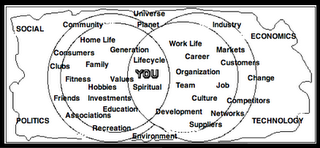
Future by Life Design
Chapter One: Basecamp
By Steve Howard, CKO
The Knowledge Labs
Table of Contents
Chapter One: Basecamp
Chapter Two: The Ridge
Chapter Three: The Outpost
Chapter Four: The Tribal Territories
A few more pages into the learning expedition's journal notes, I discovered a section called, “Future by Life Design.”
The expedition sketched out overlapping concentric circles, bordered by a randomly meandering line.
In the middle of the overlapping circles, at the heart of the chart, they labeled “Me” and included “Lifecycle” and “Spiritual”
Beyond the chart’s edge – surrounding both the border of interdependent circles and chaotic squiggles -- someone had written “Universe” and scratched it out, replacing it with “Multi-Universes,” “Planet”, and “ Environment.”
Within the border at the outer edge and bounded by random, irregular lines lie “Technology,” “Economics,” “Social” and “Political.”
Just inside of “Technology” and “Economics” on the right side, moving from the outer to the inner, I encounter a circular band,“Industry,” “Competition” “Inflection Points”, “Perfect Storms”.
On the left, just inside of “Social” and “Politics” I see “Generations,” “Communities,” “Consumers,” “Clubs and Volunteer Organizations,” and “Values.”
Moving “one circle” away from the heart – “Me, Lifecycle and Spiritual,” yet, just inside of “Industry, Competition, Inflection Points, and Perfect Storms” I discovered “Work Life.”
And, mirroring it on the left, I find another circle, “Home Life” sitting just inside of “Generations, Communities, Consumers, Clubs, Volunteer Organizations and Values.”
Inside of “Home Life” and one step removed from the overlapping heart of the chart sits “Family,” “Friends,” “Fitness,” “Hobbies,” “Recreation,” “Education,” “Investments” and a couple more that have been smeared by drops of water.
Finally, inside “Work Life” I can make out “Career,” “Job,” “Organization,” “Culture,” “Markets,” “Customers,” “Suppliers,” “Networks and Alliances,” “Team,” and “Training.”
Is this how the expedition decided what course to take? Is this meant to be the playing field, I wonder.
Are we all at the center of our own lives taking a past, present and future snapshot of an ever-changing, interdependent system?
This must be what Grey Owl meant when he quoted Sun Tzu by saying, “The world is a place full of interesting options for those who plan to fully explore their potential.”
Got Knowledge?
Copyright ©2002 - 2006 Aarnaes Howard Associates. All rights reserved worldwide.
2:28 PM
Saturday, June 29, 2002
My Lucky Day
Chapter One
By Steve Howard, CKO
The Knowledge Labs
Table of Contents
Chapter One
Chapter Two
Chapter Three
Chapter Four
Scorpio (Oct. 23 - Nov.21) Focus on children, challenge, sex appeal and marital status. You discern the "direction of your life." You will receive proposals involving partnership. Capricorn involved.
Is that you? Got Knowledge?
Copyright ©2002 Aarnaes Howard Associates. All rights reserved worldwide.
9:59 AM
Friday, June 28, 2002
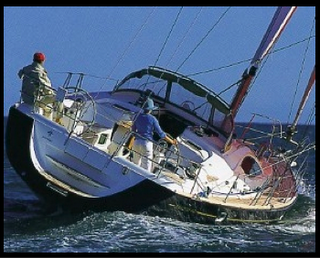
Learning Expedition – Answering a Call to Adventure
Chapter One: Basecamp
By Steve Howard, CKO
The Knowledge Labs
Table of Contents
Chapter One: Basecamp
Chapter Two: The Ridge
Chapter Three: The Outpost
Chapter Four: The Tribal Territories
Journal Entry
All this “Game of Life” stuff got a little too much for me.
Find a way to win by: beginning when no goal is given; creating a purpose for my own journey; setting a course which also serves others; and creating better opportunities for those who follow.
Let’s just say, I was willing to suspend my critical thinking a little bit more. But, I really needed something more concrete.
By accident, I found another journal called, “Learning Expedition – Answering My Call to Adventure”. It lay dusty with cobwebs under my bed. I never would have seen it, if I hadn’t knocked my contact lens on the floor and had to get on my hands and knees to find it.
On page one I found a crude map drawn. A path connected four locations: Basecamp, Ridge, Outpost, Tribal Network. Somebody had scribble notes in the margins.
Basecamp. Map the expedition, a compelling vision of a desirable future, a survey of our past, and an analysis of our current situation.
Ridge. View the terrain ahead, locating threats and opportunities, shifting the load according to the expedition's assets and liabilities, finding landmarks along the way.
Outpost: Develop error-free strategy to travel light, gathering intelligence for an information advantage, trying initiatives to accomplish the most with a single thrust.
Tribal Network: Negotiate with influencers for resources, building scenarios and tactics for the best, worst, and most probable conditions.”
Now, we’re getting somewhere, I thought. But, where?
Again, from the learning expedition’s log.
“The foot prints lead out of this foggy mist through a narrow passage. You can't tell exactly where they lead -- somewhere out into the unknown.
Our leader, we've come to call him Pathfinder, says we'll be gone for several days before we come back. We're heading out to this place called Basecamp to make final preparations for our extended journey.
Pathfinder encouraged us to begin taking notes about our surroundings. Impressions, associations, images that pop into our head.
While this expedition won't last as long, he's asked us to begin looking forward -- at least 5 to 10 years out. And that far back.
The first thing that jumped out at me is all the craziness before and after the millennium passing – from 1999 to 2002 with Y2K, the presidential election, the dot bomb implosion, 9/11 terrorist attack, to Enron and Anderson ethics and governance crisis.
Historians and journalist describe the craziness as merely the transformation from one century to the next. Is a cycle playing out? Or, is all this uncertainty entirely new and unpredictable?
Pathfinder also asked us to jot down what we thought were safe predictions about the future. What we thought would absolutely come true. And then to list all the uncertainties -- stuff we weren't so sure about.”
The last entry tugged at me.
“For all those who read this and follow, Welcome to the crossroads. Where any path can take you to any destination. But, there is only one journey worth taking ... the one answering your own, unique call to adventure. What's your legacy? When will your journey begin?”
Got Knowledge?
Copyright ©2002 - 2006 Aarnaes Howard Associates. All rights reserved worldwide.
6:57 AM
Wednesday, June 19, 2002

The Way of the Adventurer
Chapter One: Basecamp
By Steve Howard, CKO
The Knowledge Labs
Table of Contents
Chapter One: Basecamp
Chapter Two: The Ridge
Chapter Three: The Outpost
Chapter Four: The Tribal Territories
Second Journal Entry on Day 4
The loud noise startled me. Half expecting my mentor, Master Sun's stunt double -- Grey Owl, to reappear at some point before I leave this cabin and continue on my vacation, I turned around. Over there by the bookcase a book had fallen off the shelf. Somehow it landed upside down, opened to this page. A little eery.
The Art of Strategy, R.L. Wing, Doubleday, N.Y., 1988, page 147
“The Nine Situations and Variations
Expand and manipulate the advantages and manage the conditions of others.
Their study cannot be neglected.
Generally, it is the Tao of the Adventure
To penetrate as a result of Focus and to be superficial as a result of Idleness.
Those who are in an Isolated Situation
Must cross over the boundaries of the organization toward the opposition.
Those who are in an Intersecting Situation
Must communicate all around.
Those in a Serious Situation
Must penetrate deeply.
Those who are in a Simple Situation
Must penetrate superficially.
Those who are in a Surrounded Situation
Must defend the exit and narrow the advance.
Those who are in a Desperate Situation
Must press onward without a location.
Thus, in Idle Situations, we lead by directing ourselves as One.
In Simple Situations, we lead by making use of dependent domains.
In Competitive Situations, we lead by hurrying our backups.
In Negotiable Situations, we lead by attending to our defenses.
In Intersecting Situations, we lead by strengthening our connections.
In Serious Situations, we lead by maintaining the flow of provisions.
In Obstructed Situations, we lead by advancing on the Path.
In Surrounded Situations, we lead by blocking any openings.
In Desperate Situations, we lead by making it known we may not survive.
For under the conditions of Strategy,
Those who are surrounded will resist;
Those who can neither gain nor stop will fight;
Those who are beyond their limit will obey.
Therefore, those who do not know the Plan of other leaders
Are not prepared to negotiate.
Those who do not know the positions of the mountains, forests, passes, and marshes
Are not able to Move the Force.
Those who do not employ local guides
Are not able to gain advantage in the Situation.”
I’m not sure what all this means, but I’ve decided to add it to my knapsack for reading and digesting along the way.
Got Knowledge?
Copyright ©2002 - 2006 Aarnaes Howard Associates. All rights reserved worldwide.
7:01 AM
Saturday, June 15, 2002
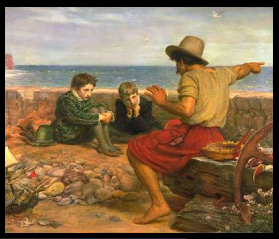
The Gripping Stories of Human Life
Chapter One: Basecamp
By Steve Howard, CKO
The Knowledge Labs
Table of Contents
Chapter One: Basecamp
Chapter Two: The Ridge
Chapter Three: The Outpost
Chapter Four: The Tribal Territories
Journal Entry Day 4
Rattling Around in this Cabin Retreat. Here’s another book on the adventure bookshelf, one that speaks to creating my purpose …
The Awakened One, Sherab Chodzen Kohn, Shambala, 1993
"The story of a human life grips us very directly because it is a case history of the condition we all share.
Since beginningless time people have listened to stories of what others have done, feeling for the pattern in life these stories might reveal, exploring for their own possibilities, their own boundaries.
We want to know where life can go, what can be made of it, how far its scope can extend.
Are there barriers?
Are there hidden treasures?
Though we may appear settled, we are always testing, testing at our edges and limits or retreating from having done so.
Convention, ordinary life, provides an artificial definition and an artificial safe haven.
But the walls of convention are thin.
If we pass through them, what is the real reach and range of existence that lies beyond?"
Got Knowledge?
Copyright ©2002 - 2006 Aarnaes Howard Associates. All rights reserved worldwide.
7:49 AM
Monday, June 10, 2002
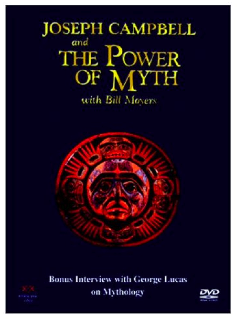
The Bliss Man and This Mysterious Game of Life
Chapter One: Basecamp
By Steve Howard, CKO
The Knowledge Labs
Table of Contents
Chapter One: Basecamp
Chapter Two: The Ridge
Chapter Three: The Outpost
Chapter Four: The Tribal Territories
Journal Entry, Day 3
Here I am in this cabin retreat. So, I’m supposed to keep a journal? Look around me? Wait for my inner voice, great.
Interdependent systems? Beginning when no goal is given? What is this some sort of flashback?
Creating a purpose, hmm.
What’s that on the bookshelf? The bliss man. The Power of Myth by Joseph Campbell & Bill Moyers, Doubleday, 1988. Oh, I loved that PBS series.
Let’s see, creating a purpose. What about this passage on page 163:
"Everybody has his own possibility of rapture in the experience of life. All he has to do is recognize it and then cultivate it and get going with it. I always feel uncomfortable when people speak about ordinary mortals because I've never met an ordinary man, woman, or child...
MOYERS: So the experience of illumination is available to anyone, not just saints or artists. But if it is potentially in every one of us, deep in that unlocked memory box, how do you unlock it?
CAMPBELL: You unlock it by getting somebody to help you unlock it. Do you have a dear friend or good teacher? It may come from an actual human being, or from an experience like an automobile accident, or from an illuminating book. In my own life, mostly it comes from books, though I ... had ... magnificent teachers."
MOYERS: But people ask, isn't a myth a lie?
CAMPBELL: No, mythology is not a lie, mythology is poetry, it is metaphorical. It has been well said that mythology is the penultimate truth -- penultimate because the ultimate cannot be put into words. It is beyond words, beyond images, beyond that bounding rim of the Buddhist Wheel of Becoming.
Mythology pitches the mind beyond that rim, to what can be known but not told. …It is important to live life with the experience, and, therefore, the knowledge of its mystery and of your own mystery.
This gives life a new radiance, a new harmony, a new splendor. Thinking in mythological terms helps to put you in accord with the inevitables of this vale of tears...
The big question is whether you are going to be able to say a hearty yes to your adventure...of the hero -- the adventure of being alive."
Got Knowledge?
Copyright ©2002 - 2006 Aarnaes Howard Associates. All rights reserved worldwide.
7:21 AM
Saturday, June 08, 2002
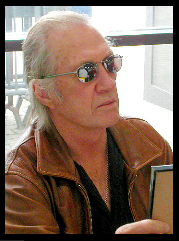
Hoodoo You Know, What’s That Calling?
Chapter One: Basecamp
By Steve Howard, CKO
The Knowledge Labs
Table of Contents
Chapter One: Basecamp
Chapter Two: The Ridge
Chapter Three: The Outpost
Chapter Four: The Tribal Territories
Journal Entry, Day 2
While Sun Tzu wrote about secrets to winning wars, CEOs apply his teachings to the way they conduct their business – how to be a good leader -- how to outflank their opponents. Waiting for inspiration in a Sun Tzu frame of mind, I met his modern day equivalent quite by accident -- a coach known locally simply as Grey Owl.
Feeling a lot like David Carradine’s Grasshopper seated at the knees of his master, I asked the first question.
Journal of 2020 Foresight: What is about the core of Sun Tzu's teachings that others have found so profound? How does his perspective reveal hidden secrets for so many career changers and job seekers and at the same time for so many military and business leaders?
Grey Owl: Ah, you must be speaking about the elusive Tao. The smooth way things tend to operate in nature. When events are manipulated, they are not Tao, and outcomes are dangerously uncontrolled.
J2020F: What Phil Jackson calls “playing in the moment.”
Grey Owl: Perhaps. To have the Tao at work in a situation, or a strategy, is considered the greatest of advantages, since the operation becomes effortless and the results predictable. It is as though all the forces of nature are working toward one's own objective
J2020F: For the Lakers it is “having the game come to them,” as Phil says.
Grey Owl: Perhaps.
J2020F: I can see I want effortless and predictable results, especially during this time of rampant confusion. I mean, who doesn’t? But I don’t understand how to achieve it.
Grey Owl: Look around you, what do you see?
J2020F: I see those Hoodoos -- that pillar of rocks over there.
Grey Owl: And what do you know about them and about the story of this area?
J2020F: Well, I picked up a little information. They began to form 10 million years ago when the earth created and moved the massive blocks called Table Cliffs and Paunsaugunt plateaus. Table Cliff rocks now tower over the same layers 2000 feet below.
While native American people were present in the region about 12,000 years ago, little remains to describe what they experienced, how they lived, what had happened to them.
Eventually Paiutes moved into the region once occupied by the Anasazi and Fremont cultures.
They lived there until settlers and explores arrived in the 1870s when John Wesley Powell and Captain Clarence E. Dutton explored the area. The Paiutes described the hoodoos as legend people who had been turned to stone by Coyote.
Grey Owl: Now look up, what do you see?
J2020F: The sky, the cloud formations.
Grey Owl: And last night as you gazed into the night?
J2020F: Billions of stars, the Milky Way. I could imagine myself being the Hubble telescope and peering out into our galaxy and into other galaxies, and multiple universes, perhaps. And then looking down on me standing here on “this thin blue marble.”
Grey Owl: You saw evidence of the laws of nature -- both human nature and nature at large. Since all of life is subject to these laws, whether they are enacted microscopically or sociologically, understanding these laws and then applying them is a way to triumph over life's conflicts-- from the interpersonal to the international.
J2020F: You mean the world is a complete and interdependent system that must be preserved. So no one part of the system can triumph if it destroys another part, for this will damage everyone.
Do you mean in a similar way that the body's immune system works? Designed to fight off invaders, suppress insurgency, overwhelm malignancies, and remove hostile agents -- all without damaging the supporting system?
Grey Owl: Yes. Within such a system, tactics can be used to overcome psychological obstacles, environmental discord, personal opposition, and organizational contention.
J2020F: Ok, but when do I learn how to apply them?
Grey Owl: Not until you finish your work here.
J2020F: What do you mean?
Grey Owl: Why did you come here?
J2020F: I’m on vacation.
Grey Owl: No, why did you seek my coaching?
J2020F: I’m stuck, I guess. The game isn’t coming to me. I’m at a cross roads in my life and I don’t know which path to take. These choices used to be easier when I was younger.
I don’t know whether to change positions in my same organization or to change organizations in the same field?
Whether to change careers or to grow in my same job and simply moonlight?
Whether to start a business. Or to buy a business or to buy a franchise?
Maybe I should develop a consulting practice or pursue a portfolio career?
Whether to live off my investments and freelance to supplement my income?
Grey Owl: You experience a conflict in yourself and in your environment.
J2020F: Yes. I guess so.
Grey Owl: The world is a place full of interesting options for those who plan to fully explore their potential.
As Sun Tzu counseled, when confronted with an obstacle -- a crippling character flaw, an unfulfilling occupation, or a debilitating interpersonal relationship—the creative minority develop a strategy to overcome that conflict and emerge victorious from its influence.
They refuse to compromise their hopes or limit their opportunities. A game of chess cannot be resolved through compromise -- nor can poor health, or a demanding career, or a destructive relationship. These are life-damaging situations that must be and can be unconditionally overcome.
Is this why you seek my counsel?
J2020F: Yes. Please tell me what to do.
Grey Owl: Our time is up. I must go.
J2020F: Wait. You haven’t told me what to do or when I will see you again.
Grey Owl: This is the all about the game of life. You must find a way to win by beginning when no goal is given. By creating a purpose for your own journey. By setting a course that also serves other in their journey. And, finally, by creating better opportunities for those who follow.
J2020F. Great, more riddles. But what do I do?
Grey Owl: Look around you. Record in a journal what you see. Wait for your inner voice to tell you.
J2020F: Tell me what? Wait come back.
Got Knowledge?
Copyright ©2002 - 2006 Aarnaes Howard Associates. All rights reserved worldwide.
1:58 PM
Friday, June 07, 2002
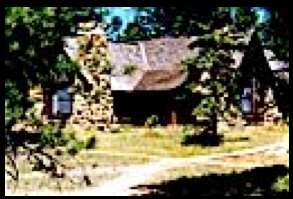
Memo from Basecamp
Chapter One: Basecamp
By Steve Howard, CKO
The Knowledge Labs
Table of Contents
Chapter One: Basecamp
Chapter Two: The Ridge
Chapter Three: The Outpost
Chapter Four: The Tribal Territories
At the time I wasn't getting anywhere. I was stuck. I needed a coach. One that would meet me on my own terms, on my own schedule. I wasn't prepared for what followed.
Journal Entry
"Why is it so difficult to slow down?
To just enjoy a moment of solitude without feeling guilty. Without feeling we are wasting productive time?
And why does it take great amounts of will power to force us to drop the urgent, day-to-day demands which continuously pull us in this direction and that direction, until we are driven to distraction?
When you finally get here, this cabin retreat, with its massive rough hewn timber ceiling, tan and brown stone fireplace, and deep rich brown leather chairs, its warmth and timeless charm immediately smothers you with a comfortable, distant, yet vaguely familiar feeling.
Maybe it's the adventure library full of slightly dusty leather-bound journals.
Maybe it's parchment charts, slightly curled at the edges. Maybe it's the crackling of logs in the orange and red glow of dancing flames. Maybe it's natural motif -- slightly Southwestern, slightly rustic mountain hideaway.
The wind howling outside. The dark green pines swaying and whistling.
Whatever it is, it is the perfect setting to replenish my reserve.
To renew my spirit, redefine myself. To focus on what is important in my life and career. To repurpose and to rededicate myself.
And to answer the question:
If all those other people can do what they love and truly make a difference in their own lives, why do I have to settle for less?
Have I come this far, traveled to this point in my life only to turn my back on what is the highest and best use of my talents in the precious time remaining?
His answer --- Not if you take the time to reflect, to recapture your own dreams, to quietly listen for your own specific purpose in life -- not what someone else wants for you -- or demands from you. Not if you begin the journey to discover or rediscover your own true calling.
I'm eager to interview him, but where is he?
Got Knowledge?
Copyright ©2002 - 2006 Aarnaes Howard Associates. All rights reserved worldwide.
6:37 AM
Thursday, June 06, 2002
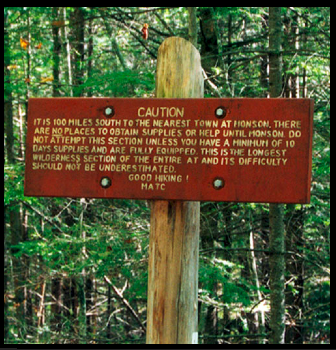
Stories from the Creative Minority
Chapter One: Basecamp
By Steve Howard, CKO
The Knowledge Labs
Table of Contents
Chapter One: Basecamp
Chapter Two: The Ridge
Chapter Three: The Outpost
Chapter Four: The Tribal Territories
Each time we come to a cross road in our life, depending upon which stage we are in, we can choose one of 11 options.
Since no one can predict the future, selecting which option to take presents a significant challenge. Making the wrong decision limits our current or future income and lifestyle.
To borrow a phrase, past performance may not be an indicator of future performance. While there are no guarantees, we can anticipate several ways our future story may unfold. We can select signposts, signals, or indicators which, when monitored, foretell which contingency plan to activate.
The creative minority, having chosen the option best suited for them in their next chapter of their life, will encounter any one of four adventure stories as they muster up the courage to follow their own path.
Finally, their journey in this chapter of their lives ends when they join one of four talent communities.
The Journal of 2020 Foresight tracks the creative minority's discoveries, experiments, and findings. It serves as both a clearinghouse and as a knowledge bank of emerging lessons and best practices for all of us answering our own calling.
Where is your path taking you? What are you learning? Have a story to share?
Got Knowledge?
Copyright ©2002 - 2006 Aarnaes Howard Associates. All rights reserved worldwide.
7:13 AM
Tuesday, June 04, 2002
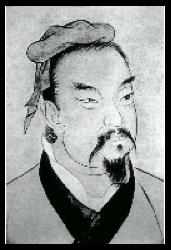
Yogi Berra and Sun Tzu at the Crossroads
Chapter One: Basecamp
By Steve Howard, CKO
The Knowledge Labs
Table of Contents
Chapter One: Basecamp
Chapter Two: The Ridge
Chapter Three: The Outpost
Chapter Four: The Tribal Territories
“When you come to a fork in the road, take it.”
Yogi Berra
Pounding the pavement?
Will you make the same mistakes over and over again? Or as you face a crossroad, will you blaze your own trail, as the creative minority does?
In my home office sits a placque my sister made for me as a reminder “Better is one’s own path … though imperfect … than the path of another well made.”
Decisions and plans, or the lack thereof, made today will influence your next 5 years. Choosing to take the sidewalk, or to blaze a new trail isn't easy. How do you anticipate the unexpected? How do you seize the ever-shifting threats and opportunities you encounter along the way?
Some of the best advice about the future, strategy and beating my opponents I've used has been around for over 2400 years. HENRY CHU, LA Times on 5/31/02 in "Ancient Secrets to Success" listed the business schools, generals, campaign managers and even internet discussions invoking Sun Tzu as a way of trying to understand the September 11 terrorist attacks.
One of the ancient wisdoms about beating the competition at its own game -- "Know your enemy and know yourself, and in a hundred battles you will never face defeat."
Here's how Alex, one of the creative minority applied that wisdom.
"After running my own professional speaking and internet consulting biz since July 2000, I decided to return to the workforce in Sept 2001. I had just begun the search when 9/11 happened which really slowed down the market.
Then the holidays kicked in and I got little response. Things were just picking up in January then Enron broke.
It really didn't turn for me until the end of March when I noticed that the market was improving a bit and I was finding more listings. I also really ramped up my efforts after I returned from a March Madness Vegas Trip.
What I did what write out a job description for a personal job search assistant, outlining exactly what I would want done on a daily basis. Then I mentally "hired myself" to do that job.
It included sending out at least 10 resumes every day, conducting follow up calls, making networking calls and attending networking events, writing thank you letters, scheduling interviews, etc. I created a simple database in Filemaker and really tracked my performance.
The first week I got back, I sent out 50 resumes. Mostly from Monster.com and FlipDog, some networking as well. I opened up my criteria to positions I really didn't think were ideal and sure enough, I got a couple of interviews.
Whenever I got a nibble, I did everything I could to get the position. Researched the company, the industry, tailored my accomplishments, etc.
The position I accepted is the Website Marketing Program Manager. I had 3 interviews with the company, meeting about 8 people all together. Even had a videoconference interview with someone out of state. The only downside is the commute, but I can deal with a drive or a relocation." Have you used a similar creative technique?
Got Knowledge?
Copyright ©2002 - 2006 Aarnaes Howard Associates. All rights reserved worldwide.
6:46 AM
|
|
| |
|
|
|